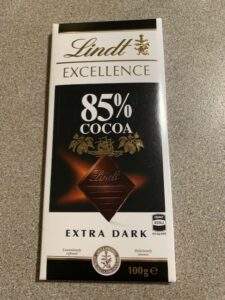Last Updated on 18/06/2022 by Miki
Table of contents
When it comes to coffee, most people think of the drink. But did you know that coffee beans can be eaten? That’s right, coffee beans are edible and can actually be quite tasty. In fact, coffee beans are the pits of coffee cherries. They are typically roasted before being ground and brewed. Eating coffee beans can give you a caffeine buzz. There are 7 things you should know about eating coffee beans. You’ll find them in this article 🙂
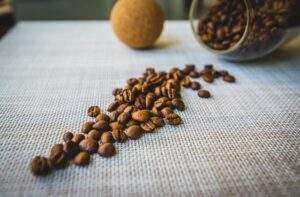
Can You Eat Coffee Beans?
Can you eat whole coffee beans?
Whole coffee beans can be eaten, but they are not necessarily enjoyable. Eating coffee beans can give you a quick caffeine jolt, but the beans are often hard and unpleasant to eat on their own.
Can you eat coffee grounds?
The short answer is yes, you can eat coffee grounds. However, it’s important to know how to properly prepare them before consuming them. Coffee grounds can be bitter, so I recommend adding them to smoothies, oatmeal, or baked goods.
Can you eat raw coffee beans?
You might be surprised to learn that you can eat raw coffee beans. However, it’s not pleasant to eat them due to the bitterness and woodiness. It’s also harder to chew them than roasted coffee beans.
What Does a Coffee Bean Taste Like?
When it comes to coffee, there are a lot of different flavours that can be found in the beans. Depending on where the bean is grown, the climate, and how it’s roasted, the flavour of the coffee can change drastically. The longer they are roasted, the darker and more intense their flavour becomes. Many people often wonder what a coffee bean actually tastes like and the answer is, that it depends. However, coffee beans usually have a nutty, earthy flavour with a slight bitterness to them.
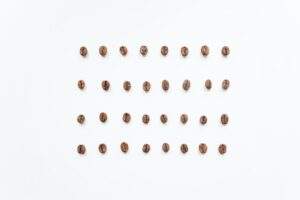
Benefits of Eating Coffee Beans
Coffee beans are more than just a morning pick-me-up. In fact, these little beans are packed with health benefits that can help improve your overall wellness. From boosting brain function to protecting against certain diseases, eating coffee beans can provide a host of health benefits.
Is eating coffee beans healthy?
Many people enjoy coffee for its taste and caffeine content but don’t realise that coffee beans are actually healthy. They are packed with antioxidants and nutrients that can help you improve your health. Coffee beans can help improve your mood, cognitive function and physical performance. They can also help protect your liver and reduce the risk of cancer. So, if you’re looking for a healthy snack, reach for a handful of coffee beans instead of a sugary treat.
Can eating coffee beans help you lose weight?
Coffee beans have been shown to boost metabolism and promote weight loss. In one study, coffee beans were found to help overweight people burn more calories and lose weight. The study showed that coffee beans can help you lose weight by increasing your metabolism and making you feel fuller longer.
Downsides of Eating Coffee Beans
Coffee beans are generally considered safe to consume. However, there are a few potential risks associated with eating coffee beans.
Can eating coffee beans hurt you?
Eating coffee beans has some potential downsides. For example, coffee beans are high in acidity, which can cause heartburn and upset stomach. They can also cause dehydration and increase anxiety. Additionally, coffee beans contain caffeine, which can be harmful in large amounts. Caffeine is a stimulant that can increase your heart rate and blood pressure. It can also keep you up at night if you have it too late in the day. This may lead to insomnia and restlessness. So, if you’re consuming a lot of coffee or you’re sensitive to caffeine, it’s important to be aware of the potential risks and you might want to limit your intake of coffee beans.
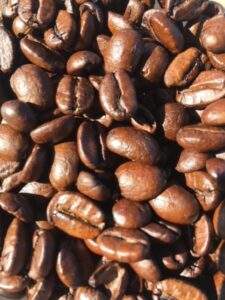
How Many Coffee Beans Can You Eat?
If you love coffee, you might be wondering how many coffee beans you can eat. While there is no definitive answer, it’s generally safe to consume up to 400mg of caffeine per day. This is equivalent to around 40 coffee beans. However, if you’re sensitive to caffeine, you’ll want to stick to just a few beans. But if you can handle more caffeine, you can eat more beans. Ultimately, it’s important to keep in mind that everyone metabolises caffeine differently, so you may need to experiment to find the right amount for you.
How Much Caffeine Is In A Coffee Bean?
Caffeine is a naturally occurring substance found in over 60 plants, including coffee beans. It’s a stimulant and globally consumed as a psychoactive drug. A coffee bean contains about 1-2% caffeine. This means that, on average, a green/unroasted coffee bean has about 2-3mg of caffeine. However, the caffeine content of a coffee bean can vary depending on the type of coffee bean, where it was grown, and how it was processed. For instance, a single shot of espresso made with Arabica beans contains about 40mg of caffeine, while a cup of brewed coffee made with Robusta can have up to 80mg.
Do roasted coffee beans have more caffeine?
The answer is actually no. Roasted coffee beans have the same caffeine content as green coffee beans. However, when you compared the two by volume, the roasted beans have more caffeine than unroasted beans. This is due to the roasting process that makes coffee beans shrink and become lighter.
Does dark roast coffee have more caffeine?
There’s a lot of misinformation out there about caffeine, and it can be hard to sort out fact from fiction. So, let’s set the record straight: do roast coffee beans have more caffeine? The simple answer is no. The amount of caffeine in a coffee bean is determined by the variety of the bean and the roasting process does not increase the caffeine content. However, the grind size does have an effect on the amount of caffeine in your cup of coffee. A finer grind will release more caffeine into your brew, so if you’re looking for a little extra caffeine, you can go for a finer grind.
This post may contain affiliate links. If you use these links to purchase something, I may earn a commission without any extra cost to you. I would appreciate it if you do so to keep this blog going!
How To Make Chocolate-Covered Espresso Beans
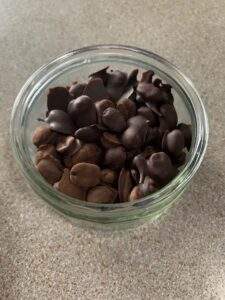
If you love the taste of espresso and chocolate, why not combine the two? Chocolate-covered espresso beans are a delicious and easy snack to make at home. All you need is a bag of espresso beans, some good quality chocolate, and a little time. Here is my simple recipe.
What you’ll need:
- 15g of your favourite coffee beans (I used dark roast.)
- 40g of your favourite chocolates (I used dark chocolate.)
- 1/4 tsp cocoa powder (optional)
Method:
- Melt the chocolate in a microwave-safe bowl or double boiler.
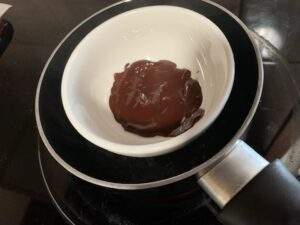
- Using a fork or spoon, dip each espresso bean into the chocolate, making sure to coat it completely.
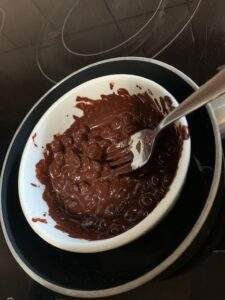
- Place the chocolate-covered beans on a sheet of baking paper to set.
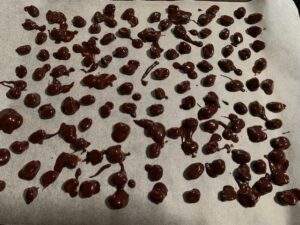
- Once they are firm, sprinkle the cocoa powder if you like.
- Store them in an airtight container.
- Enjoy them whenever you need a little pick-me-up.
Final Thoughts
So, there you have it. If you are looking for a way to change up your coffee routine, add some interest to your cup, or just want to try something new, give coffee beans a try. You may be surprised at how much you like the flavour and texture of coffee beans in your cup. Just remember to start slowly and increase the number of beans you use gradually to avoid side effects like upset stomach and increased anxiety. Also, be sure to do so in moderation and balance them out with other foods. Please share your coffee eating experience in the comment box below.

